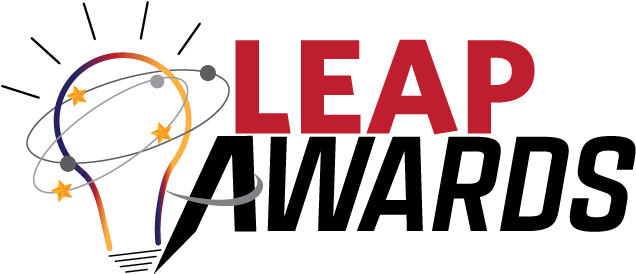The LEAP Awards celebrates the most innovative and forward-thinking products serving the design engineering space.
To see the complete list of 2019 finalists and winners, click here.
CATEGORIES
Fluid Power World
Hydraulics
Pneumatics
Design World
Additive manufacturing
Advanced materials
Fastener technology
Industrial automation
Mechanical
Motion control
Software
Switches & sensors
EE World
Connectivity
Embedded computing
Power electronics
Test & measurement
(For full category descriptions, please scroll down.)
CRITERIA
Entries submitted must be new products that are commercially available in the United States and have been released since January 1, 2018 and not previously entered in the LEAP Awards. If the product is a derivation of a past component, the updates made to the design and function must be significant. All submissions become the property of WTWH Media LLC, and the company reserves the right to publish information in any of its media outlets. Submissions are now closed.
Best applications will include or address the following:
• A basic description of the product in 250 words.
• High-resolution (300 dpi) product photo and companion data sheet.
• A list of ideal applications for the product.
• Details on any patents.
• Description of the product’s purpose. What problem does it solve? How does it improve on older products/what it evolved from? How is it different from competitive products? What advantages does it have?
• Information on the development process. Was any type of customer input or Beta testing involved? Were there technical innovations involved in developing the product?
• A description of the design aspects to the product. What were the engineering tools or processes used in the development?
• Outline how an engineer is going to advance their machinery, equipment or product designs as a result of this component or product. What kind of value does it provide to the end user or consumer? How much does this product change the industry or set itself as a benchmark?
CATEGORY DETAILS
Additive manufacturing: This category focuses on machines that build parts — typically with 3D printing layer by layer. Entries can include higher-end desktop varieties of these machines. Submissions can include technologies and machine that employ layer-by-layer builds via extrusion, vat photopolymerization, various forms of laser sintering, various forms of powder-bed, material jetting, and some forms of laminations.
Advanced materials: Enter innovative materials here that improve designs or increase design flexibility for engineers. This category also includes lubricants and additive materials.
Connectivity: In this category, enter interconnect technologies ranging from wire, cable, and connectors. Cables: Industrial motion control cables, fiber optic cables, data, power and networking designs. Connectors: ranging from board-level designs to rugged industrial round, rectangular plug and receptacle types. It also includes cable assemblies, harnesses, and protection devices such as grommets, cable glands, etc.
Embedded computing: This category is for microcontrollers (MCUs) or microprocessors (MPUs) or other custom designed chips, and supporting software in ROM (Read Only Memory) that comprise embedded computing. Also included are development tools and operating systems, computer boards, systems, and components, storage and wired and wireless connectivity, including IoT and IIoT.
Fastener technology: Enter products used specifically to fasten or join parts together in a system. This category includes ultrasonic welding technology, adhesives, fasteners, hinges, springs, sockets, washers, etc.
Hydraulics: This category focuses on hydraulic components and subsystems including but not limited to pumps, motors, cylinders, valves, hose assemblies, sensing technologies, HPUs, accumulators, filtration and sealing technologies.
Industrial automation: This category is for components and services that execute or prompt system-level functions and impart machines with advanced networking and connectivity; power management; safety; transmission and management of system and operation-level information; and other IoT capabilities. For motors, we recommend this automation category if the motor’s leading features are associated with ease of integration (with controls and drives); sophistication in flexibility (in terms of acceptable inputs and outputs); or support of centralized, decentralized, and distributed control.
Mechanical: This category includes bearings, gears, pulleys, clutches, brakes, sprockets, and other power-transmission components. We recommend entering motors in this category if their innovative features are mechanical in nature — pertaining to integrated gearing or sealing; advanced housing geometry or materials; compactness or specialization to enable creative installations; or other design features aimed at boosting efficiency, ruggedness, and serviceability.
Motion control: This category is for components that improve moving machine axes. Enter intelligent electronic components such as controllers, encoders, drives, stepper drives, servo drives, and other components for which electronic control is integral to their operation.
Pneumatics: This category focuses on pneumatic components and subsystems including but not limited to air compressors, cylinders, valves, hose assemblies, sensing technologies, FRLs, vacuum grippers, suction cups, pumps and other lifting devices.
Power electronics: In this category, enter AC-DC, DC-DC power supplies, transistors and any other power electronic circuits, components or assemblies used in power electronics, including battery and battery management.
Software: Submissions here should be for design automation software and not EE focused. Appropriate entries include CAD, CAM, simulation, and additive manufacturing software.
Switches & sensors: Entries in this category should be feedback devices including mechanical switches and photoelectric, proximity, reel, and hall-effect sensors. Submissions can include devices for pressure, speed, temperature, and vibration sensing, vision systems, and edge devices.
Test & measurement: This category is for test and measurement equipment as typically used by design and development engineers engaged in product design and development. Do not enter equipment typically found only on production and assembly lines or that used outside of engineering settings.


